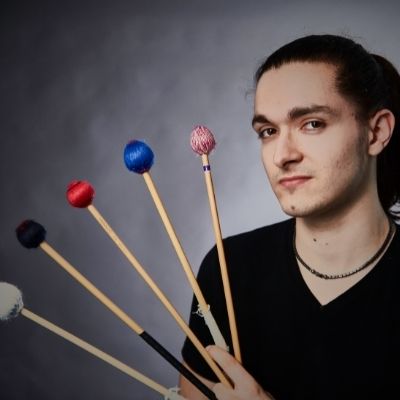Joseph Visseaux
Doctorate in performance student (classical percussion)

- In a few words, how would you describe yourself?
I’m an artist-percussionist. Artist, because I like to think that, as a musician, I’m part of a much bigger collective, a galaxy of possibles, a world in its own right where thousands of concepts intermingle and bicker with one another. And then a percussionist, because percussion has been part of my life for a very long time. There’s a vast territory inside which hundreds of instruments gather. After more than 15 years of rigorous practice in France and earning a master’s degree in percussion at the Université de Montréal Faculty of Music, I decided to get on closer terms with the instrument that spoke to me the most, the marimba, and do a specialization in it by taking a doctorate in performance.
- Tell us a little about your background.
I come from the city of Dijon, the capital of Burgundy in France, where I was introduced to music at quite a young age by my mother, who was a piano teacher. Quickly, a few piano pieces later, and driven by boundless energy, I was instinctively attracted to percussion.
After studying at the Conservatoire de Dijon, where I earned my first professional degree, I continued my studies at the Haute école des arts du Rhin in Strasbourg, a city where I got to be part of the percussion group Koremos Quartet. I’ve been continuing my education in Montréal for four years. I have nothing but gratitude towards the different teachers I’ve studied with in my musical life!
Even though I had a lot of orchestra and chamber music experience, I nevertheless chose to focus on a more personal project for my doctorate in performance.
- At the Faculty of Music, are there personalities who really impressed you?
Through his experience and his genuineness, the figure of Julien Grégoire remains a true source of inspiration for me. An inspiration that lets you constantly remind yourself that the more knowledge you acquire, the more you’re aware of what you don’t know. I could also mention the head of the Faculty’s Ensemble de musique contemporaine, Jean-Michaël Lavoie, who I have great esteem for.
- For you, percussion is…?
Percussion reveals itself to me as a vast territory, a world shaped in the light of the different cultures that are part of it. Each culture is home to instruments that journey across the territory. They mix together, collide, resemble one another, are unaware of one another, associate with one another and complement one another. Like a country that includes a wide range of accents, these instruments are united within the same family, that of percussion.
- Who’s your favorite artist, and why?
From a percussion standpoint, the contemporary composer who inspires me the most is Gene Koshinski. He’s an American percussionist I discovered close to a dozen years ago, through his Concerto for Marimba and Chorus, a work that incited me to improve my technique. Apart from being an outstanding percussionist, he’s one of the most prolific current composers where the percussion repertoire is concerned.
- What are your inspirations?
All strong and inventive personalities who’ve succeeded in giving their ideas solid form despite the obstacles.
- What advice would you give to first-year students?
I’d advise them to define for themselves a scale of goals in order to set off on their curriculum with confidence, from very short-term (daily) to very long-term (beyond the degree). Also, to quickly understand their strengths as musicians, to hold on to them and strengthen them.
- What are the three most important qualities for a musician?
PortraitAbove all else, the ear. It’s crucial to have, and to develop, a fine sense of the people around us, their playing, their intentions, their sound, their breathing and their physical presence.
Next, I think artists must keep an ear open to their own emotions. They have to draw energy from them to enable the music to exist, but at the same time not be overwhelmed by them, the goal being to serve music.
Finally, lucidity. You have to be extremely aware, and at every moment in your career, of the considerable amount of work that the life of a musician requires. Never rest on your laurels, or at least, use them to acquire new ones!
- Outside music, what are your interests?
I’m especially interested in politics, in cryptocurrency and in virtual reality.
- What are your aspirations?
I aspire to a better understanding of the world around me, of interpersonal relationships and of the cultural issues that lie ahead. And I hope finally to be wiser tomorrow than I am today. As Rabelais put it, “Science without conscience is but the ruin of the soul.” I think that attention devoted to music allows us to develop in many areas.
- What are your plans for the future?
In my post-doctorate years I plan to do recordings of transcriptions for marimba of key works by Québec composer André Mathieu: the Rhapsodie Romantique, the Concerto de Québec and his Fourth Piano Concerto in C minor.
February 2022